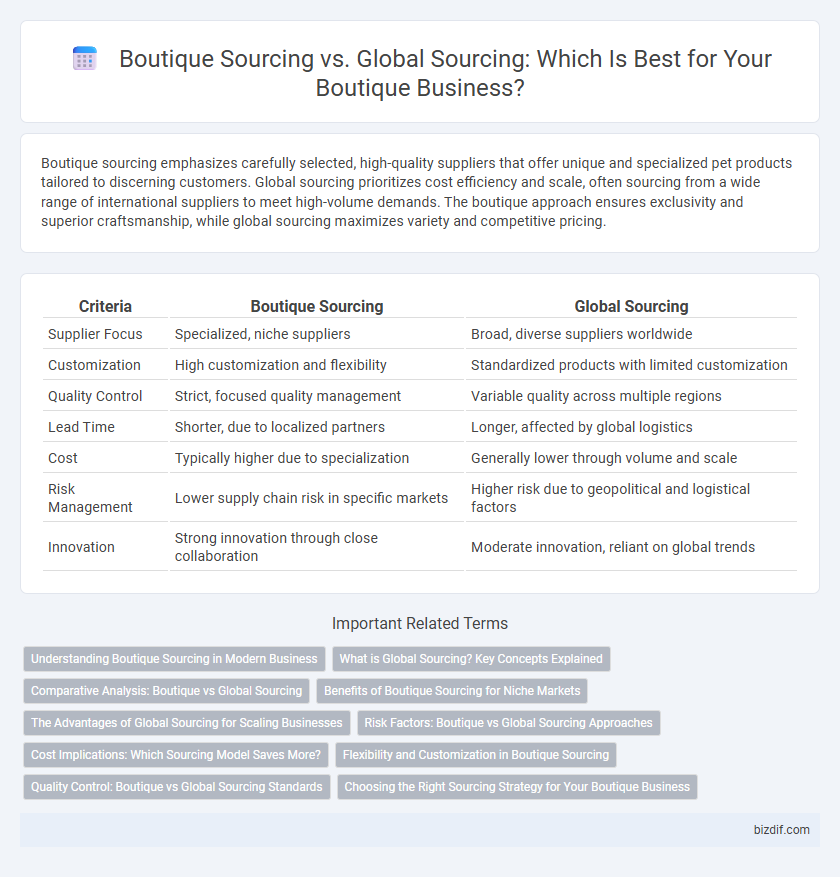Boutique sourcing emphasizes carefully selected, high-quality suppliers that offer unique and specialized pet products tailored to discerning customers. Global sourcing prioritizes cost efficiency and scale, often sourcing from a wide range of international suppliers to meet high-volume demands. The boutique approach ensures exclusivity and superior craftsmanship, while global sourcing maximizes variety and competitive pricing.
Table of Comparison
| Criteria | Boutique Sourcing | Global Sourcing |
|---|---|---|
| Supplier Focus | Specialized, niche suppliers | Broad, diverse suppliers worldwide |
| Customization | High customization and flexibility | Standardized products with limited customization |
| Quality Control | Strict, focused quality management | Variable quality across multiple regions |
| Lead Time | Shorter, due to localized partners | Longer, affected by global logistics |
| Cost | Typically higher due to specialization | Generally lower through volume and scale |
| Risk Management | Lower supply chain risk in specific markets | Higher risk due to geopolitical and logistical factors |
| Innovation | Strong innovation through close collaboration | Moderate innovation, reliant on global trends |
Understanding Boutique Sourcing in Modern Business
Boutique sourcing specializes in tailored, niche suppliers that offer high-quality, unique products and services ideal for companies seeking customization and exclusivity. This approach contrasts with global sourcing, which prioritizes cost-efficiency and large-scale production through international suppliers. Understanding boutique sourcing enables modern businesses to leverage agility and specialized expertise, enhancing brand differentiation and customer satisfaction.
What is Global Sourcing? Key Concepts Explained
Global sourcing involves procuring goods and services from international markets to leverage cost efficiencies, quality improvements, and access to wider supplier networks. Key concepts include evaluating supplier capabilities, managing cross-border logistics, navigating tariffs and trade regulations, and aligning sourcing strategies with global market trends. This approach contrasts with boutique sourcing by emphasizing scale, diversity of suppliers, and often longer supply chains to optimize overall operational performance.
Comparative Analysis: Boutique vs Global Sourcing
Boutique sourcing offers tailored, high-quality products with a focus on niche markets, enabling personalized customer experiences and agility in adapting trends. Global sourcing leverages large-scale suppliers worldwide, emphasizing cost-efficiency and extensive product variety but often sacrificing customization and longer lead times. Comparative analysis highlights boutique sourcing's strength in exclusivity and craftsmanship, whereas global sourcing excels in volume production and competitive pricing.
Benefits of Boutique Sourcing for Niche Markets
Boutique sourcing offers tailored solutions that cater specifically to niche markets, ensuring products and services align perfectly with unique customer preferences and industry standards. This approach enhances quality control, fosters stronger supplier relationships, and allows for greater agility in responding to market trends compared to global sourcing. Companies benefit from increased brand differentiation and customer loyalty by leveraging the specialized expertise and exclusive offerings provided through boutique sourcing.
The Advantages of Global Sourcing for Scaling Businesses
Global sourcing offers scaling businesses access to a broader supplier base, enabling cost reductions and enhanced product variety that boutique sourcing may lack. It facilitates leveraging international expertise and innovation, accelerating time-to-market and competitive advantage. The scalability of global sourcing supports higher volume demands and operational flexibility critical for rapid business growth.
Risk Factors: Boutique vs Global Sourcing Approaches
Boutique sourcing minimizes risk by focusing on specialized vendors with deep market expertise and strong local relationships, reducing supplier failure and quality inconsistencies. Global sourcing exposes companies to higher risks such as geopolitical instability, longer supply chains, and currency fluctuations, impacting delivery times and cost predictability. Companies prioritizing agility and quality control often prefer boutique sourcing to mitigate disruptions inherent in global supply networks.
Cost Implications: Which Sourcing Model Saves More?
Boutique sourcing often results in higher upfront costs due to specialized services and limited economies of scale, yet it offers tailored quality that can reduce expenses from defects or delays. Global sourcing leverages large-scale production and competitive pricing, potentially lowering unit costs but increasing risks related to logistics, tariffs, and supplier reliability. Analyzing total cost of ownership reveals boutique sourcing may save more in niche markets requiring customization, while global sourcing excels in volume-driven cost efficiency.
Flexibility and Customization in Boutique Sourcing
Boutique sourcing offers unparalleled flexibility and customization by tailoring procurement strategies to specific business needs, unlike global sourcing which often follows standardized processes. This approach enables boutique firms to adapt quickly to market changes and deliver unique, high-quality products with precise specifications. The personalized service in boutique sourcing ensures stronger supplier relationships and swift adjustments, enhancing overall supply chain responsiveness.
Quality Control: Boutique vs Global Sourcing Standards
Boutique sourcing emphasizes stringent quality control with tailored inspections and personalized supplier relationships, ensuring superior craftsmanship and attention to detail. Global sourcing often relies on standardized processes and large-scale audits, which may compromise nuanced quality aspects in favor of cost efficiency. Boutique sourcing standards prioritize product uniqueness and high-quality materials, setting a benchmark that global sourcing struggles to consistently meet.
Choosing the Right Sourcing Strategy for Your Boutique Business
Boutique sourcing offers personalized supplier relationships and niche product selections tailored to the unique needs of boutique businesses, ensuring higher quality and exclusivity. Global sourcing enables access to a broader range of materials and cost efficiencies by leveraging international suppliers and economies of scale. Selecting the right sourcing strategy depends on factors such as product differentiation, lead time requirements, budget constraints, and the importance of supplier collaboration for your boutique's brand identity.
Boutique Sourcing vs Global Sourcing Infographic

 bizdif.com
bizdif.com